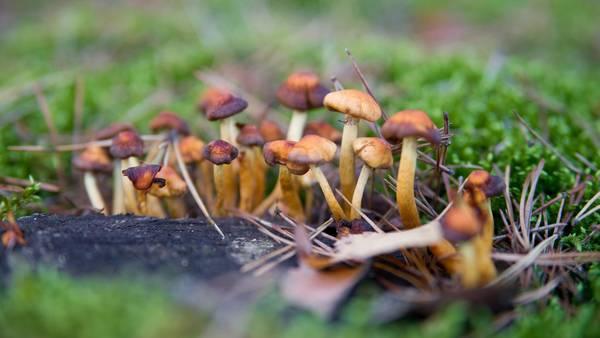These are the results of a new investigation of mind scans from shut to 60 individuals receiving treatment for despair, led by Imperial School London&rsquos Centre for Psychedelic Study. The group at the rear of the analyze thinks it may well have untangled how psilocybin exerts its therapeutic effects on the mind.
Psilocybin is just one of a amount of psychedelics remaining explored as a prospective therapy for psychiatric issues. Quite a few scientific studies have trialled a synthesised sort of the drug to treat patients with despair and stress, with promising success. 
The new outcomes, taken from two merged scientific studies, reveal that individuals who responded to psilocybin-assisted remedy showed greater mind connectivity not just through their procedure, but up to 3 months afterwards. This &ldquoopening up&rdquo influence was linked with self-described improvements in their despair.
Nevertheless, identical alterations in mind connectivity were being not seen in people dealt with with a typical antidepressant (identified as escitalopram), suggesting the psychedelic is effective in a different way in dealing with depression. 
In accordance to the workforce, the findings, released right now in the journal Character Drugs, are a promising advance for psilocybin therapy, with the effects replicated across two research. They clarify that styles of mind exercise in melancholy can grow to be rigid and restricted, and that psilocybin could potentially assist the brain to break out of this rut in a way that conventional therapies are not able to.
The paper&rsquos senior author Professor Robin Carhart-Harris, previous Head of the Imperial Centre for Psychedelic Investigation who is now based at University of California, San Francisco, said: &ldquoThe outcome observed with psilocybin is consistent throughout two reports, related to people today receiving superior, and was not observed with a conventional antidepressant. 
&ldquoIn previous experiments we had observed a equivalent result in the mind when men and women were scanned even though on a psychedelic, but here we&rsquore looking at it months just after procedure for melancholy, which implies a &lsquocarry about&rsquo of the acute drug action."
 
Advancements with psilocybin treatment
Original conclusions from two research carried out at Imperial claimed a reduction in actions of despair, but the system underpinning how the treatment exerts these results has been unclear.
In the hottest study, a crew led by Imperial&rsquos Centre for Psychedelic Research analysed fMRI scans of contributors from these two trials, which bundled nearly 60 participants: an open up label trial in therapy-resistant melancholy &ndash the place all individuals received psilocybin and a randomised handle trial in extra normal melancholy that compared psilocybin with the selective serotonin reuptake inhibitor (SSRI) escitalopram.

All contributors also acquired speaking therapies with registered psychological overall health specialists and brain scans ended up taken in advance of, and then a person working day or 3 months after members acquired psilocybin therapy.
Equally trials found advancements with psilocybin therapy, as measured by enhanced participant scores on medical questionnaires. Analysis of the brain scans unveiled altered conversation or connectivity amongst brain areas. 
Extra exclusively, they identified an boost in conversation between those brain locations that are a lot more segregated in depressed individuals.
They identified a correlation concerning this impact and symptom advancement in each trials &ndash even though the toughness and period of result various involving contributors, it was strongest in people who documented an enhancement in signs and symptoms.
The researchers included that though adhere to-up data is nonetheless staying analysed for members, first adjustments in brain exercise just one working day next remedy had been a excellent predictor of no matter whether a particular person would nonetheless demonstrate enhancement at six months.  
Professor Carhart-Harris extra: &ldquoWe don&rsquot yet know how extensive the adjustments in brain exercise noticed with psilocybin therapy last and we have to have to do more investigate to realize this. click for more info do know that some folks relapse, and it could be that immediately after a although their brains revert to the rigid styles of exercise we see in depression.&rdquo
The authors caution that while these conclusions are encouraging, former trials examining psilocybin for depression took position less than managed, clinical circumstances, employing a controlled dose formulated in a laboratory, and associated substantial psychological assist ahead of, all through and after dosing, delivered by mental health professionals.
Patients with despair need to not try to self-medicate with psilocybin, as taking magic mushrooms or psilocybin in the absence of these very careful safeguards might not have a beneficial consequence. 
Professor David Nutt, Head of the Imperial Centre for Psychedelic Investigation, stated: &ldquoThese conclusions are essential since for the 1st time we locate that psilocybin will work in different ways from common antidepressants &ndash creating the brain a lot more adaptable and fluid, and significantly less entrenched in the damaging pondering styles related with depression. This supports our preliminary predictions and confirms psilocybin could be a serious different tactic to melancholy remedies.&rdquo 
Professor Carhart-Harris mentioned: &ldquoOne fascinating implication of our conclusions is that we have identified a basic mechanism by using which psychedelic therapy performs not just for depression &ndash but other psychological health problems, these as anorexia or addiction. We now need to exam if this is the scenario, and if it is, then we have uncovered a little something critical.&rdquo
The study was supported by funding from the Alex Mosley Charitable Believe in and founding donors of the Imperial Centre for Psychedelic Investigate. First writer Dr Richard Daws, who is now dependent at King&rsquos School London, was supported by the Imperial College London EPSRC Centre London for Doctoral Instruction (CDT) in Neurotechnology.